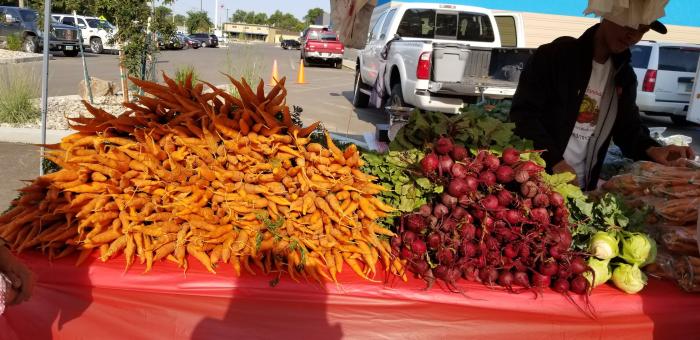High Tunnel Helps Turn Gardening Hobby into Business in Mountrail County
A New Jersey native, Charlie Hannon isn’t a farmer by trade, but throughout his adult life he has always enjoyed raising a vegetable garden to sustain his family.
Kindra Gordon writes from Whitewood, S.D.

Hannon has spent his career working in oil fields in Montana, the Philippines, Alaska, and most recently North Dakota.
He, his wife Rosie and their daughter purchased 11 acres north of Stanley, N.D., and when the oil industry slowed down a couple years ago, Hannon says, “Our gardening hobby turned into a business.”
As a beginning farmer, Hannon worked with the Natural Resources Conservation Service (NRCS) Stanley Field Office and secured an Environmental Quality Incentives Program (EQIP) contract to add a 30 by 50-foot high tunnel house to their operation to extend their growing season and expand their vegetable production. The high tunnel, also called a hoop house, was constructed in 2017, and Hannon Farms began using the high tunnel for the 2018 growing season. “It allowed us to start our crops earlier in the spring, and we could raise tomatoes and red and green peppers in the tunnel throughout the summer,” shares Hannon.
They sell their produce via local farmer’s markets, including the Oak Park Farmers Market in Minot, N.D. on Tuesdays, Thursdays and Saturdays through the summer season. “It’s a full-time job,” says Hannon, who still balances the farm with his work in the oil fields. Hannon Farms employs 1-2 workers through the summer.
Hannon credits NRCS Soil Conservationist Tighe Teets with being “a wealth of knowledge,” as they planned their high tunnel for the farm, and adds, “without the cost-share assistance from EQIP the project, it would have been cost prohibitive for us on our own.” Hannon was introduced to the NRCS office through other farm friends.
Teets, an avid gardener himself, says he became a believer in high tunnels for North Dakota after attending a seminar hosted by nearby Bottineau Community College highlighting their multi-year research on high-tunnels in North Dakota.
“Placement of the high tunnel requires consideration; the North Dakota wind can be tough on them,” reports Teets. But with a tree shelter to protect them, they can be successful, he adds.
The Stanley NRCS Field Office is working with a few additional small farmers to add high tunnels to their operations, and Hannon Farms plans to add a second high tunnel house to their operation in 2019, Teets says.
The EQIP program requires that producers using cost-share funds for a high tunnel must use it for a business venture and sell their produce to farmer’s markets or retail stores. The high tunnel must also be placed on former or existing cropland.

